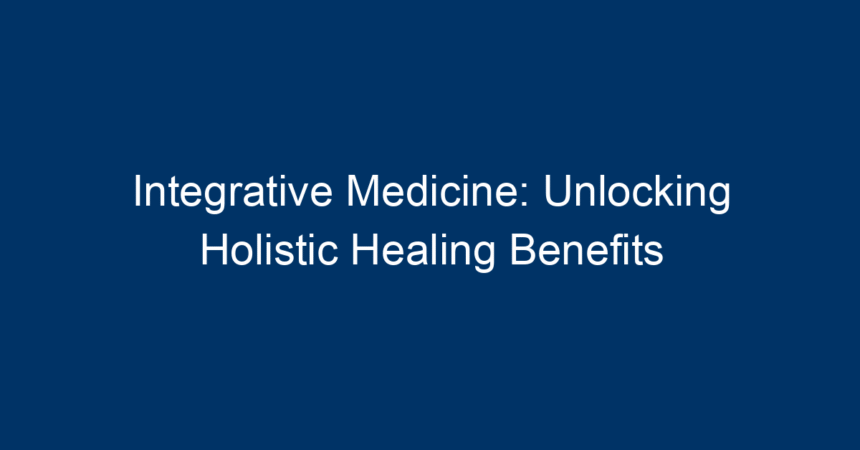In recent years, there has been a significant shift in how we approach healthcare. While traditional medicine has its merits, an increasing number of individuals are exploring integrative medicine as a more holistic approach to healing. This form of healthcare not only addresses physical symptoms but also emphasizes emotional, mental, and spiritual well-being. In this article, we will delve deep into the concept of integrative medicine, its benefits, various practices, and how it can lead to a more balanced and healthier life.
What is Integrative Medicine?
Integrative medicine merges traditional Western medical practices with alternative therapies. Unlike conventional treatments that often focus solely on alleviating symptoms, integrative medicine seeks to understand and address the underlying causes of diseases. This approach considers a person’s overall lifestyle, including diet, exercise, mental health, and social relationships, crafting a personalized treatment plan for each individual.
The Core Principles of Integrative Medicine
-
Patient-Centered Care: Integrative medicine places the patient at the center of the healthcare process. Practitioners take the time to understand the patient’s unique experiences, preferences, and needs.
-
Holistic Approach: This philosophy believes that healing involves the whole person, not just the physical ailments. The emotional, mental, and social aspects are just as important.
-
Collaboration: Integrative medicine fosters collaboration between healthcare providers to ensure comprehensive care. Conventional physicians often work hand-in-hand with alternative practitioners, such as acupuncturists and nutritionists.
- Focus on Prevention: Integrative medicine emphasizes preventative care through lifestyle changes and wellness practices. This proactive approach can help reduce the onset of chronic diseases.
Holistic Healing Benefits
1. Enhanced Emotional Well-being
Integrative medicine recognizes the powerful connection between mind and body. Several studies highlight that mental health is often intertwined with physical health. Practices like mindfulness, meditation, and yoga can significantly improve emotional resilience, reduce stress, and promote overall well-being.
2. Improved Physical Health
By incorporating nutrition, exercise, and alternative therapies, integrative medicine can lead to enhanced physical health. For instance, patients managing chronic pain may benefit from yoga or acupuncture, which can reduce reliance on medications and minimize side effects.
3. Personalized Treatment Plans
Every individual is unique, and integrative medicine acknowledges this. Practitioners take the time to create tailored treatment plans that incorporate various modalities, ensuring that each patient’s specific needs are met.
4. Empowering Patients
Integrative medicine encourages individuals to take an active role in their healing journey. By providing education and resources, patients are empowered to make informed decisions about their health, leading to greater satisfaction and outcomes.
5. Reduction in Healthcare Costs
An emphasis on preventative care, combined with holistic therapies, can significantly reduce the need for costly medical interventions. By promoting better health and preventing chronic diseases, integrative medicine can contribute to lower healthcare expenses overall.
Common Practices in Integrative Medicine
Integrative medicine encompasses a wide range of practices and therapies. Here are some of the most commonly used modalities:
1. Nutritional Counseling
Nutrition plays a vital role in overall health. Integrative medicine emphasizes whole foods and individualized dietary plans tailored to specific health concerns. Nutritional counseling can help manage conditions like diabetes, heart disease, and obesity.
2. Mind-Body Techniques
Mindfulness practices, meditation, and breath control are essential components of integrative medicine. These techniques have been shown to lower stress levels, improve mood, and promote relaxation.
3. Acupuncture
Originating from Traditional Chinese Medicine, acupuncture involves inserting thin needles into specific points on the body. This approach aims to balance the body’s energy and alleviate various conditions, including chronic pain and anxiety.
4. Herbal Medicine
Herbal remedies are frequently incorporated into integrative medicine to support health and treat various ailments. Practitioners may recommend natural supplements and herbs that have demonstrated efficacy in scientific studies.
5. Physical Therapy and Exercise
Physical activity is vital for maintaining physical well-being. Integrative medicine often includes movement therapies, such as yoga or tai chi, to promote strength, flexibility, and balance.
The Role of Integrative Practitioners
Integrative medicine practitioners come from diverse fields and backgrounds, including doctors, psychologists, nutritionists, and herbalists. Each brings unique expertise and perspectives to the healing process. For example, a physician specializing in integrative medicine may work alongside a nutritionist to create a complete wellness plan that includes both medical and dietary strategies.
Qualifications of Integrative Medicine Practitioners
When seeking an integrative medicine practitioner, it’s essential to ensure they are properly qualified. Look for:
- Accredited Credentials: Ensure they have the necessary certifications and licenses in their respective fields.
- Experience in Integrative Approaches: A practitioner familiar with both conventional and alternative therapies can provide well-rounded care.
- Patient-Centered Philosophy: Seek out someone who prioritizes your individual needs and health goals.
Choosing Integrative Medicine
If you are considering integrating these holistic healing methods into your life, here are some actionable insights to get started:
1. Do Your Research
Learn about the different modalities available within integrative medicine. Understand how they might complement your current health care regime.
2. Consult with a Qualified Practitioner
Find a reputable integrative medicine practitioner who can assess your needs and help design a personalized treatment plan. Consider seeking recommendations and reviews from other patients.
3. Stay Open-Minded
Integrative medicine often involves exploring new therapies and approaches that may be outside your comfort zone. Keep an open mind and be willing to try different modalities.
4. Focus on Lifestyle Changes
Consider incorporating small, sustainable changes into your daily routine. This could involve eating whole foods, practicing mindfulness, or engaging in regular physical activity.
5. Be Patient
Healing is often a gradual process. Give yourself time to adapt to new practices and be patient with your progress.
Conclusion
Integrative medicine represents a transformative approach to health care that prioritizes holistic healing and patient autonomy. By addressing the mind, body, and spirit, integrative medicine holds the potential to improve overall well-being, enhance emotional resilience, and support physical health. Embracing this comprehensive model can lead you to a more fulfilling and balanced life. Whether you are managing a chronic condition or simply looking to enhance your well-being, consider tapping into the benefits of integrative medicine. The path to health is as unique as you are—unlock its full potential today.




